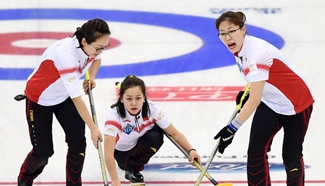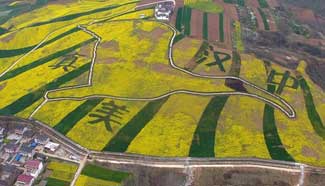CHENGDU, March 21 (Xinhua) -- Deep in the mountains of Wolong National Nature Reserve in southwest China, forest ranger Duan Minggao patrols a plantation frequented by giant pandas.
Duan, from Xingfu Village, "Village of Happiness," in Sichuan Province, said people in Wolong once struggled to make a living by digging herbs and extracting timber.
From the 1950s till the late 1990s, forests in Sichuan supported a large number of loggers. In the logging heyday, about 100,000 workers were cutting trees there.
For Duan, 46, the money was not so good. "I was only just making ends meet with less than 10,000 yuan (1,450 U.S. dollars) each year, barely enough to support my family," he said.
Sichuan is home to 3.8 million people living under the national poverty line. Wolong is a special administrative area directly headed by the provincial forestry department and has long been in dire financial straits.
Logging not only damaged the physical environment, but played havoc with the ecosystem and brought many species, the giant panda not least among them, under threat.
That sad situation is now changing. The government is encouraging residents to plant trees and restore the environment. There are jobs as well as subsidies, effectively changing the lives of people in Sichuan, particularly in Wolong, home of the emblematic giant panda, standard bearer for these efforts.
By 2020, the Sichuan government will have encouraged 88 poor counties to return their land to forests through favorable policies, Rao Sidan, head of Sichuan's forestry department, told Xinhua this week.
HAPPIER LIVES IN HAPPINESS VILLAGE
About 30 years ago, most villagers in Wolong depended on wood to warm their homes and cook their food. They got through about 4,500 square meters of forest each year. The situation not only consumed the forests, but also threatened the pandas.
"I remember when I was a little boy, I saw a panda with two playful panda cubs in front of my house," Duan said. "As I approached them, the sudden engine noise of a logging truck in the forest scared them away."
But even as people laid the mountains bare and drove away the pandas, most in Wolong remained poor, Duan said.
Things took a turn for the better in 1998, when China banned commercial logging in natural forests in the upper reaches of the Yangtze and in the upper and middle reaches of the Yellow River. Wolong stands right at the center of the Yangtze restoration project.
Realizing that people depended on the trees and herbs, the local government gave subsidies to villagers, who then grew some corn and potatoes. Last year, the local government started give residents in the 700,000-hectare reserve jobs as forest rangers earning 12,000 yuan each year on average. There are also other types of subsidies.
Last year, once impoverished residents filled 11,000 job vacancies, and with each job, an average of 3.3 people escape poverty.
Duan Minggao was one of those picked and now wears a number of different hats in Wolong. He is a road maintenance officer, a forester and a warden. His warden work alone pushed his annual earnings well above 12,000 yuan. Now he earns more than 30,000 yuan a year.
"Now we are not only making more money, but the mountains are green again," he said.
Afforested land in Sichuan has increased to 24 million hectares, and statistics from the provincial water resources department reveal that compared with 1999, the amount of sediment in the lower reaches of the Yarlung and Minjiang rivers, both major tributaries of the Yangtze, has decreased by almost half.
Local people are also leading better lives with more disposable income. Duan has replaced old household items like his ancient stove and rickety wooden table with modern, electrical appliances and furniture in what is now a bright, clean home.
"Every family in Xingfu Village has cheap electricity these days," Duan said. "We don't need to burn wood anymore."
Behind the cheap electricity supply is more than 2.3 million yuan of government subsidies each year.
"A better environment has really helped us live better lives," said Zhao Mingxia from Gengda Township. "We are devoted to making the mountains greener and making the water cleaner. What's good for the pandas is good for the people too."
And the greener mountains have brought the pandas back. The fourth national survey of giant pandas in 2015 showed the number of pandas had increased by 268 to 1,864.
Forestry department head Rao Sidan said the government aims to plant more than 650,000 hectares of forest in Sichuan in 2017 and will try to raise forest coverage in the province to 40 percent by 2020.
"We want to make the upper reaches of the Yangtze a place of true happiness for people and panda alike," Rao said.












